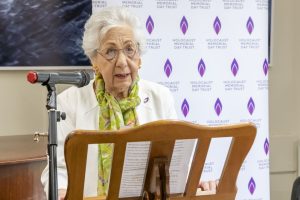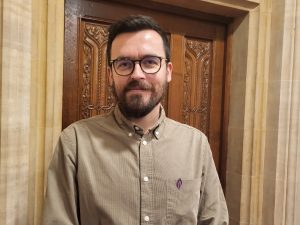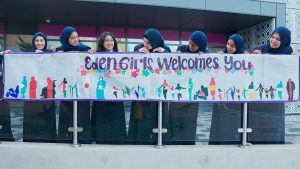HMD 2025 Theme
For a Better Future is the theme for Holocaust Memorial Day 2025.

HMD 2025: For a better future
This Holocaust Memorial Day (HMD) marks the 80th anniversary of the liberation of Auschwitz-Birkenau, the largest Nazi concentration camp complex, and the 30th anniversary of the genocide in Bosnia.
80 years on from the liberation of Auschwitz-Birkenau, antisemitism (anti-Jewish hatred) has increased significantly in the UK and globally following the 7 October attacks in Israel by Hamas and the subsequent war in Gaza. Extremists are exploiting the situation to stir up anti-Muslim hatred in the UK. Many UK communities are feeling vulnerable, with hostility and suspicion of others rising. We hope that HMD 2025 can be an opportunity for people to come together, learn both from and about the past, and take actions to make a better future for all.
There are many things we can all do to create a better future. We can speak up against Holocaust and genocide denial and distortion; we can challenge prejudice; we can encourage others to learn about the Holocaust and more recent genocides. There are some practical suggestions both at the end of this paper and here: Take Action for a Better Future.
Learn for a better future
We can learn both from and about the Holocaust and more recent genocides, for a better future.
Whilst racism and hatred do not always lead to genocide, all genocides begin with insidious stages including propaganda, ‘othering’ and dehumanisation. Professor Gregory Stanton has developed an academic model outlining 10 stages of genocide, demonstrating that genocide is a process that develops in stages that are predictable – but not inevitable. And at each stage preventive measures can stop it. Learning about the Holocaust and more recent genocides can help us all to identify the warning signs in the world around us.
The Holocaust was the attempt by the Nazis and their collaborators to destroy all Jewish people in Europe. It took place across 22 different countries with the active participation of some of the citizens of those countries. Building upon centuries of antisemitism (anti-Jewish hatred), persecution of Jewish people began as soon as the Nazis came to power in Germany in 1933. Classification, dividing people into ‘us’ and ‘them’ followed with the Nuremberg laws which discriminated against Jews, stripping them of their German citizenship. They were forced to wear yellow stars, a visual manifestation of the hatred which escalated to dehumanisation, polarisation, persecution. Ultimately it led to the extermination of 6 million Jewish people.

Helen Aronson BEM
Helen Aronson BEM (pictured) was only 12 years old when the German army arrived at her home. She was one of around only 750 people to be liberated from the Łódź Ghetto, out of 250,000 people. Her mother and brother survived with her, but her father was murdered at Chełmno. Today she shares her experiences to school children to ensure as many people as possible can learn from the past, for a better future:
I hope by sharing my experiences people can better understand how inflicting suffering on one another benefits nobody, and instead find ways to reach out and open our hearts. I believe education, especially for our children, is key to renouncing hate and prejudice whenever we encounter it and to break down the barriers that may exist between us.

Smajo Bešo OBE
The stages of genocide were also evident in Bosnia. In 1992, Non-Serbian citizens in north-west Bosnia were forced to wear white armbands. This was a few years before the genocide in Srebrenica in 1995 where around 8,000 Bosnian Muslim men and boys who were murdered. Smajo Bešo OBE (pictured) shares his experiences during the genocide in Bosnia, including the murder of his Aunt Emina. He has taken action for a better future by founding the Bosnian Genocide Educational Trust, so that we can all learn from the genocide and survivors’ lived experiences of war to reflect on its contemporary relevance.
Remember for a better future
Whole families and whole communities were wiped out in the Holocaust, and in many cases, we don’t even know the names of those murdered. David Berger was born in Przemysl, south-east Poland. He left his hometown when the Germans invaded in 1939, and was shot dead in Vilnius, Lithuania two years later. It is estimated that he was 22 years old when he was murdered. Before he was murdered in the Holocaust he wrote:
If something happens, I would want there to be somebody who would remember that someone named D. Berger had once lived. This will make things easier for me in the difficult moments.
Whilst David’s life was taken from him, we can honour his memory and remember him. We can assert the truth of his history in the face of contemporary Holocaust denial and distortion.
There were also some people who opposed the Nazis, who realised that they could and had to take action. During the Holocaust, the White Rose movement, a group of five students and their teacher, challenged the Nazi regime, asking German people to react to the violence and oppression which were all around them, but ultimately they paid with their lives.
Today: Take action for a better future

Eden Girls’ School, Waltham Forest
Today, Holocaust distortion, denial and trivialisation are all increasing. Holocaust denial is any attempt to deny the Holocaust happened, whilst Holocaust distortion is where the Holocaust is acknowledged to have happened, but the extent or nature of the Holocaust is questioned, minimised, trivialised or even inverted – for example, where Jews today are likened to Nazis. Holocaust denial and distortion are both forms of antisemitism (anti-Jewish hatred) and should be confronted. 80 years on from the liberation of Auschwitz-Birkenau, as living witnesses rely on us to carry forward their legacy, silence must not be an option.
This Holocaust Memorial Day, we all have an opportunity to take action for a better future. A better future where people are not suffering prejudice or persecution because of their faith, ethnicity or other characteristic.
Holding an event, activity or exhibition on Holocaust Memorial Day brings your community, your group, your class, your friends together. This enables people of all backgrounds to remember those who were murdered because of who they were, to learn from genocide and to commit to take further action for a better future.
In the face of increasing antisemitism (anti-Jewish hatred), Holocaust and genocide denial and trivialisation, and recent rises in racism:
- Call out Holocaust or genocide denial and trivialisation when you see or hear it – see our Tackling Holocaust denial and distortion in the classroom resource for more information on what Holocaust denial and distortion is, and how to tackle it in the classroom.
- Use reputable, authoritative sources both to learn more about the Holocaust and genocides, and to share with others. Here are some key sources to get you started:
- The Holocaust Memorial Day Trust website
- The websites of the members of the HMD Partnership Group
- The United States Holocaust Memorial Museum
- Yad Vashem – The World Holocaust Remembrance Center
- Report all hate crimes to the police and the relevant bodies (contact details below). In an emergency, always call 999.
- True Vision for racist hate crime, eg those targeting Black, Asian or Roma people
- CST for reporting antisemitism (anti-Jewish hatred)
- Tell Mama for reporting anti-Muslim or Islamophobic attacks
80 years after the liberation of Auschwitz-Birkenau, we must become the generations who carry forward the legacy of the witnesses, remember those who were murdered and challenge those who would distort or deny the past, or who discriminate and persecute today. We can all mark Holocaust Memorial Day 2025 and commit to making a better future for us all.